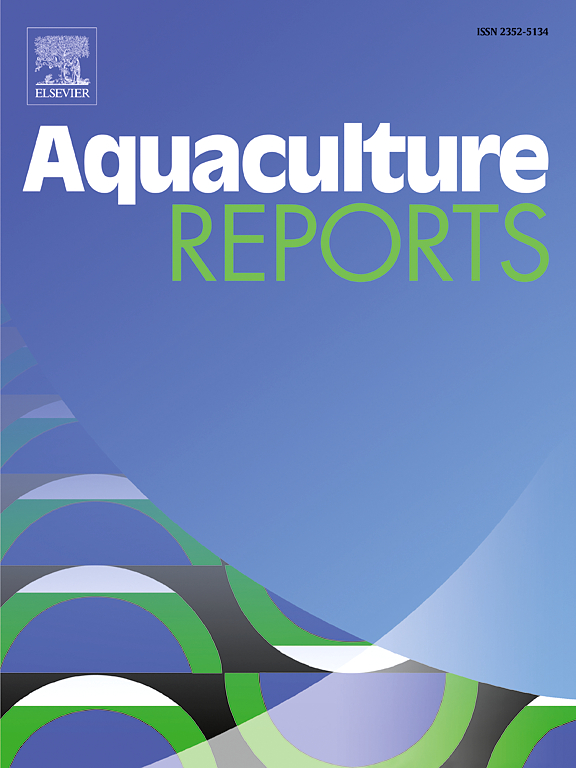Transcriptomic responses to transportation stress in the juvenile Chinese sea bass (Lateolabrax maculatus)
IF 3.2
2区 农林科学
Q1 FISHERIES
引用次数: 0
Abstract
Transportation is a necessary aspect of the aquaculture industry that might induce inevitable stress and compromise product quality. In the present study, the transcriptomic profiles in the brain and liver of Chinese sea bass (Lateolabrax maculatus) were characterized after transportation stress at two different densities (low-density: 20 kg/m3 and high-density: 40 kg/m3). Transcriptome analysis revealed that 485 and 627 differentially expressed genes (DEGs) were determined in the brain and liver from sea bass after transportation stress, respectively. KEGG enrichment analysis demonstrated that the DEGs were significantly enriched in focal adhesion, PI3K-Akt, MAPK signaling pathway, apoptosis, and circadian rhythm under transportation stress. Protein-Protein Interaction (PPI) networks showed that COL1A1, COL1A2, COL5A2, COL10A1, and COL16A1 associated with protein digestion and absorption, together with LUM, SERPINH1, and ADAMTS2 were recognized as hub genes in the brain, while JUN, NFKB1, MAPK14, MAP3K7, HSPA1, HSP90AA1, PIK3CA and PIK3R1 tightly related to MAPK and PI3K-Akt signaling pathway and SMAD3 and PPARGC1A were considered as hub genes in the liver. These results indicated that the alterations in transcripts of sea bass are primarily involved in cell adhesion, signal transduction, immune response, and metabolic regulation in response to transportation stress. Our study provides new perspectives into the molecular mechanism underlying responses to transportation and theoretical support for optimizing transportation in the Chinese sea bass.
中国鲈鱼幼鱼对运输压力的转录组反应
运输是水产养殖业的一个必要环节,可能会引起不可避免的应激并影响产品质量。本研究对中国鲈鱼(Lateolabrax maculatus)在两种不同密度(低密度:20 千克/立方米和高密度:40 千克/立方米)的运输应激后大脑和肝脏的转录组特征进行了分析。转录组分析表明,运输应激后,海鲈大脑和肝脏中分别有 485 和 627 个差异表达基因(DEGs)。KEGG富集分析表明,在运输应激下,DEGs在病灶粘附、PI3K-Akt、MAPK信号通路、细胞凋亡和昼夜节律等方面明显富集。蛋白质-蛋白质相互作用(PPI)网络显示,与蛋白质消化和吸收相关的COL1A1、COL1A2、COL5A2、COL10A1和COL16A1以及LUM、SERPINH1和ADAMTS2被认为是大脑中的枢纽基因、而与 MAPK 和 PI3K-Akt 信号通路密切相关的 JUN、NFKB1、MAPK14、MAP3K7、HSPA1、HSP90AA1、PIK3CA 和 PIK3R1 以及 SMAD3 和 PPARGC1A 被认为是肝脏中的枢纽基因。这些结果表明,海鲈转录本的变化主要涉及运输应激时的细胞粘附、信号转导、免疫应答和代谢调节。我们的研究为了解中国鲈鱼对运输反应的分子机制提供了新的视角,并为优化中国鲈鱼的运输提供了理论支持。
本文章由计算机程序翻译,如有差异,请以英文原文为准。
求助全文
约1分钟内获得全文
求助全文
来源期刊

Aquaculture Reports
Agricultural and Biological Sciences-Animal Science and Zoology
CiteScore
5.90
自引率
8.10%
发文量
469
审稿时长
77 days
期刊介绍:
Aquaculture Reports will publish original research papers and reviews documenting outstanding science with a regional context and focus, answering the need for high quality information on novel species, systems and regions in emerging areas of aquaculture research and development, such as integrated multi-trophic aquaculture, urban aquaculture, ornamental, unfed aquaculture, offshore aquaculture and others. Papers having industry research as priority and encompassing product development research or current industry practice are encouraged.
 求助内容:
求助内容: 应助结果提醒方式:
应助结果提醒方式:


